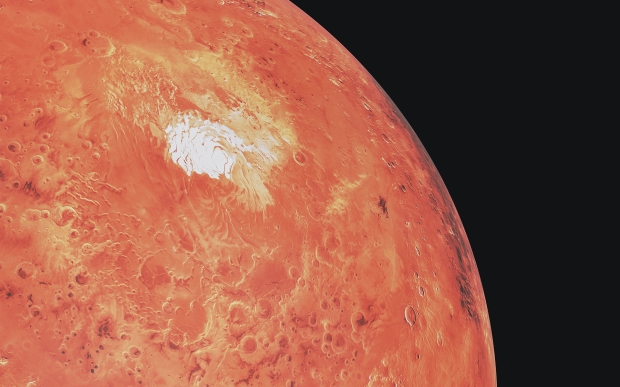Humans have discovered quite a bit about Mars, with the Red Planet being the most explored planet in the solar system as multiple rovers have and are traversing the surface gathering data that is then sent back home.

With this data, researchers were able to theorize with substantial evidence that Mars was once home to water, which created now ancient river systems. These river systems, or their remains, were observed by NASA's Perseverance rover, leading scientists to believe that Mars once had liquid water that may have harbored life. The theory that Mars was once home to life hinges on the fact that the Red Planet once had water, but what if Mars never had as much water as what we think?
A new study suggests that the evidence of ancient water systems on Mars, which are the carvings thought to be created by flowing water, may not have been created by water at all, but instead, by explosively evaporating carbon dioxide ice. Notably, Mars' atmosphere consists of approximately 95% carbon dioxide, and when temperatures drop to -120 degrees Celsius (-184 Fahrenheit), the carbon dioxide freezes so fast it skips the liquid phase.

As the planet continues to orbit the Sun, it eventually reaches its heating phase, which happens quickly. So quickly that the frozen carbon dioxide could easily skip the liquid phase and move straight into a gas.
"This influences our ideas about water on Mars in general, and therefore our search for life on the planet," said Lonneke Roelofs, a planetary researcher at Utrecht University
If completely correct, these findings would suggest that liquid wasn't present on the Red Planet in the quantities that we thought it did, thus changing how we look at Mars as both a planet seen today and how it was millions of years ago. On a more positive note, NASA's Perseverance rover is currently exploring the surface of the Red Planet, collecting samples from various locations that will eventually be transported back to Earth.
"We call that 'sublimation.' The process is extremely explosive due to Mars' low air pressure. The created gas pressure pushes sediment grains apart causing the material to flow, similar to debris flows in mountainous areas on Earth. These flows can reshape the Martian landscape-even in the absence of water. The results of my research suggest that the chance of life having existed on Mars is smaller than previously thought," added Roelofs
Researchers have previously stated that we won't really know much about the history of Mars until those samples are returned back to Earth and undergo thorough analysis. It's possible that Perseverance is already carrying a sample that contains enough evidence to definitively say Mars was once home to life, even if that life was microbial. Unfortunately, those samples likely won't be returned to Earth until sometime in the 2030s, as NASA's Mars Sample Return mission has been plagued with delays and setbacks.
"We know for sure that there was once water on the surface of Mars. This study does not prove the contrary," Roelofs says. "But the emergence of life likely needs a long period where liquid water was present. Previously, we thought that these landscape structures were formed by debris flows driven by water because of their similarity to debris flow systems on Earth."
"My research now shows that, in addition to debris flows powered by water, the sublimation of frozen CO2 can also serve as a driving force behind the formation of these Martian gully landscapes. That pushes the presence of water on Mars further into the past, making the chance of life on Mars smaller."
The convoluted plan to return the samples has undergone reengineering, and following the success of the now out-of-commission Mars helicopter named Ingenuity, we now could see multiple rotorcrafts being sent to the Red Planet to assist with the collection of the samples. Only time will tell.




